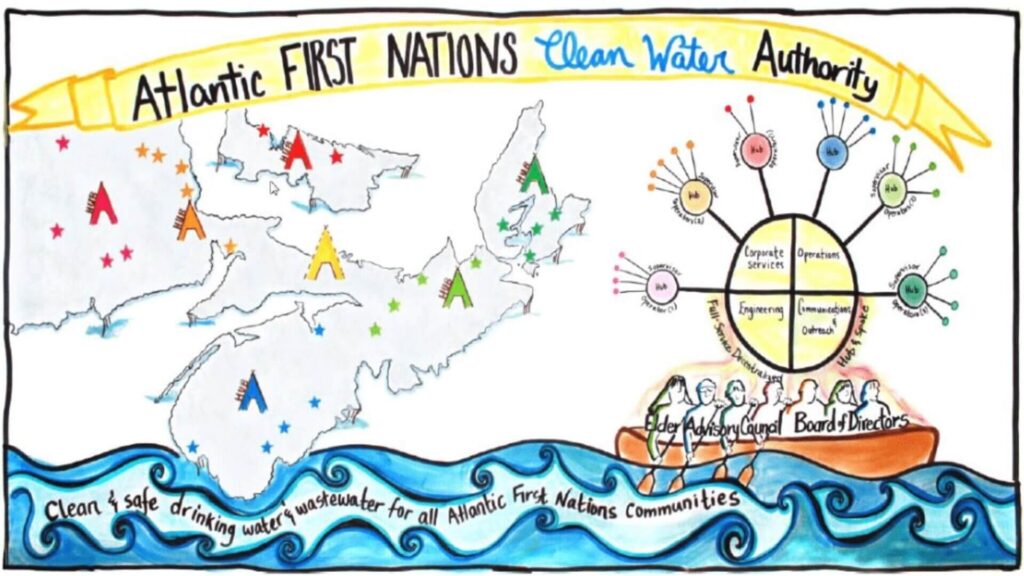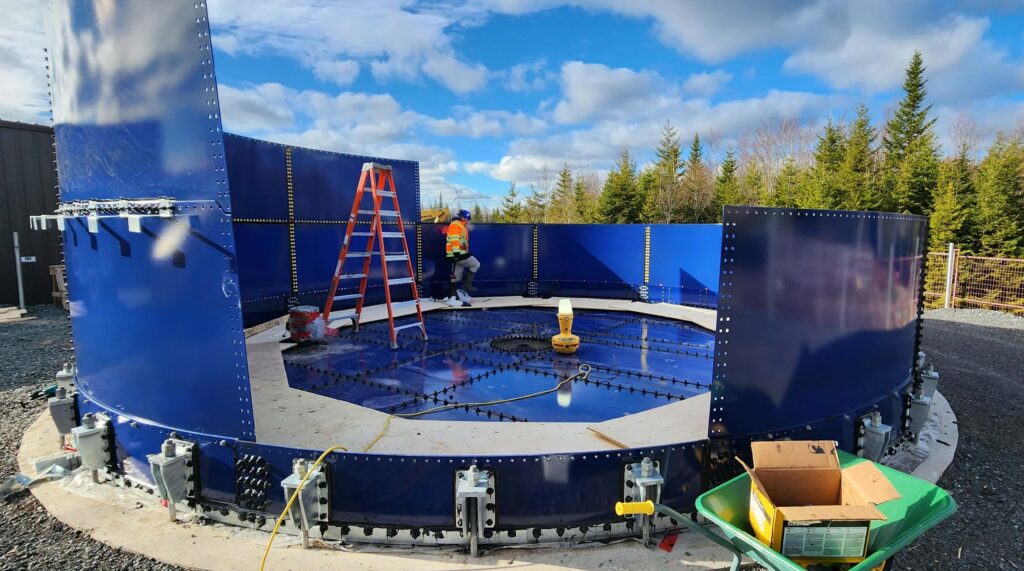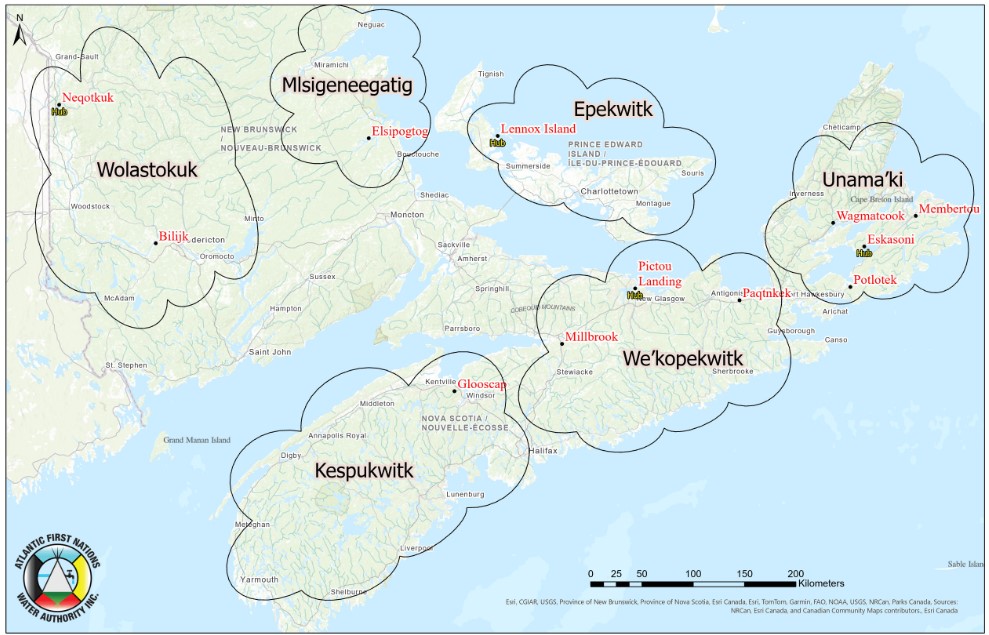
The Atlantic First Nations Water Authority (AFNWA) is the first Indigenous-owned water and wastewater utility in Canada. It is responsible for the operation, maintenance, and upgrades of all water and wastewater assets in 13 First Nations on the traditional territories of Mi'kma'ki and Wolastoq, within the Atlantic region of Canada. The NIEDB met with AFNWA representatives in May 2024 in Millbrook, Nova Scotia.
Background
The Atlantic First Nations Water Authority (AFNWA) made history in 2018 by incorporating as the first not-for-profit Indigenous-owned and -led water and wastewater utility in Canada, the result of collaboration between Indigenous Services Canada (ISC), the Atlantic Policy Congress of First Nation Chiefs Secretariat, and First Nations and industry partners. The establishment of the authority was a significant step for First Nations toward self-determination and control of the resource that is central to the health of their communities and the environment.
In 2022, the AFNWA signed a service delivery transfer agreement with Indigenous Services Canada giving the AFNWA full responsibility for the operation, maintenance and upgrades of all water and wastewater assets in participating First Nations in the Atlantic region. 13 of the 34 First Nations communities in Atlantic Canada have since joined the AFNWA with the possibility of serving more communities in the future.
The federal government has committed about $257 million in funding, including $173 million over 10 years, named in budget 2022, to help facilitate the continued transfer of services.
The utility is led by a Board of Directors of up to 15 members, including 12 from First Nations leadership and three technical experts.
Challenges
The creation of the AFNWA and its mission to provide water and wastewater services to First Nations communities was driven by the urgent need to resolve long-standing infrastructure problems and provide a more sustainable and First Nations-led approach to water management.

Before the AFNWA was established, water and wastewater systems in First Nations communities were operated and managed by the individual bands who relied on Indigenous Services Canada for annual funding for maintenance and infrastructure upgrades. That government funding often fell far short of what was needed to maintain the system. Communities were left to grapple with boil water advisories, failing infrastructure and outdated technology, putting the community’s health and safety at risk.
Through the United Nations Declaration on the Rights of Indigenous Peoples Act Action Plan, Canada committed to continue efforts to:
- Advance water and wastewater service transfer to First Nations communities
- Support self-determined service delivery models in First Nations communities
- Provide pathways to protect source water and legally enforceable safe drinking water protections on First Nations lands, similar to those in place in provinces and territories
Solutions
With the service delivery transfer agreement in place and the utility fully operational, First Nations communities in the region can choose to join the AFNWA after receiving approval from Chief and Council. Through the AFNWA, members gain control over their water and wastewater services, which in turn supports the community’s self-determination and socio-economic advancement. Reliable water and wastewater infrastructure encourages businesses and industries to expand into the community, increasing economic opportunities for community members.
The Atlantic Chiefs and their Band Councils determined that a Full Service Decentralized (FSD) model best fits their vision of ownership and values. The FSD model means that services are organized into different service areas, with central hubs that provide support to nearby communities.

Because First Nations communities are spread across a large area with geographical challenges, the FSD model ensures that every community is within a 2.5-hour drive from its designated hub. The model is also flexible, meaning that as more First Nations join, new operators can be added to support them without changing the overall structure.
As an Indigenous-owned and operated authority, the AFNWA generates long-term employment and career opportunities for Indigenous Peoples in the region and supports operators to become certified to work in their home community.
To address inconsistent and chronic underfunding, the AFNWA secured long-term funding from the federal government based on 10-year cycles. Instead of 13 communities bargaining individually with ISC for funding, the authority now represents them all. This allows for strategic investment in infrastructure and staffing and ensures that participating First Nations are no longer subject to conditional Government of Canada applications for capital funding.
The AFNWA’s work is guided by the Elders Advisory Lodge, which applies traditional knowledge, emphasizing environmental stewardship, the spiritual aspects of water, and the concept of Etuaptmumk (Two-Eyed Seeing). The Elders Advisory Lodge named each of the six service regions in Mi’kmaw and Wolastoqey, the languages of the First Nations being served.
Results
The landmark service delivery transfer agreement between ISC and the AFNWA set an important precedent to advance Indigenous self-determination across Canada.
In February 2025, Weso’tmk Samqwan Incorporated (WSI), a Mi’kmaq-led organization, signed an agreement with ISC to take control over water and wastewater services in six First Nation communities in New Brunswick. WSI and ISC will co-develop a service delivery transfer agreement that will include long-term funding for the organization to take on all water and wastewater delivery services.
In Spring 2024, the AFNWA and Dalhousie University received a $4.3 million NSERC Alliance-Mitacs Accelerate Grant to work together to support the AFNWA in improving infrastructure, strengthening safety and risk management, and engaging community members to ensure they are informed and empowered.
The partnership includes a plan to train a new generation of Indigenous and non-Indigenous engineers and other professionals to ensure the water authority's long-term success. This will include 20 graduate and postdoctoral research trainees, 15 undergraduate interns, and 35 First Nations high school students in Mi'kmaq and Wolastoqey communities.
In reclaiming control over their water and wastewater management, First Nations are not only securing sustainable access to clean water but also safeguarding public health, protecting vital ecosystems, and strengthening resilience against climate change and water scarcity. This self-determination fosters long-term environmental stewardship and community well-being, ensuring that future generations have the resources they need to thrive.
“As the Chair of the Board, I have had the privilege of witnessing the incredible journey of our organization. My own experiences, particularly the challenges faced by my community’s water issues, have underscored the importance of our mission. These challenges have fueled my determination to ensure that every First Nation community has access to clean and safe water and wastewater services."
Chief Wilbert Marshall